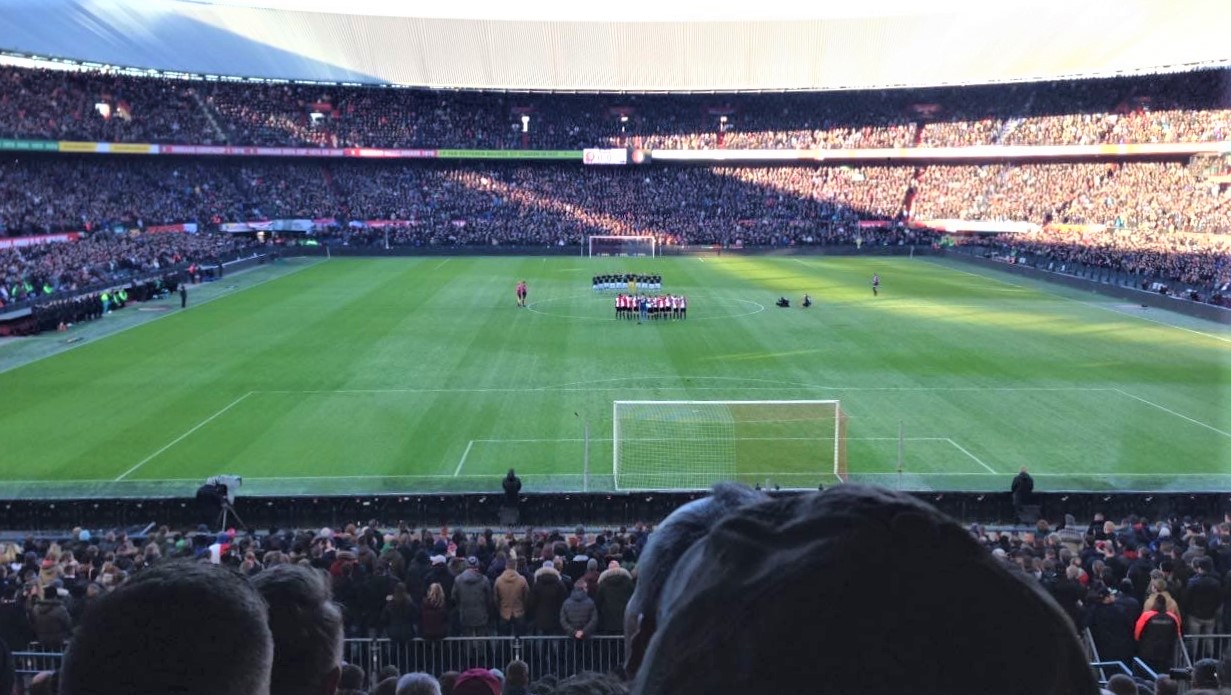Rutte is angry. Last weekend premier division football supporters cheered and shouted in the stadium, behaviour banned because of corona. How dangerous is it?
Feyenoord - Sparta, 4 December 2016, When everyone was still allowed to stand close together. (Photo Renske the King)
Just try to keep quiet if finally, after all that nerve-wracking back and forth, the ball finally flies hard and fast into the goal. In any case, it was beyond Feyenoord fans during the match against FC Twente last Sunday. You really can’t blame them. Or can you?
On Monday, in answer to the question if it were possible to keep quiet during a game, Prime Minister Rutte answered (in Dutch) “Yes of course it is. Just keep your mouth closed if you watch a game and don’t scream. It’s not that hard.” But Rutte had nothing good to say about all that cheering and singing. “It is really stupid. We will not get the coronavirus under control like this.”
What is the risk of being infected in a stadium full of screaming and singing supporters? Science is undecided. “In fact, we are in the middle of a large social biomedical experiment,” says physicist Dr Ivo Bouwmans (Faculty of Technology, Policy and Management) when asked.
Bouwmans keeps a very close eye on the literature
Apart from his research and teaching of complex energy systems, Bouwmans is the conductor of the VAK choir in Delft and a church choir. Delta had already interviewed him about the dangers of singing in choirs. What makes choirs so dangerous for corona infections? Bouwmans keeps a very close eye on the literature on this subject. He compiles the most recent scientific findings on his virmus.nl (virus + musician) website.
“Recently, it was discovered that it does not matter whether you are singing or talking in terms of the production of small droplets and aerosols. It’s about the number of decibels. The harder you sing or speak, the more droplets you produce. The assumption for a long time was that singing by definition was more dangerous because of the way you use your voice.”
“Hopefully the risks in a football stadium won’t be that bad,” Bouwmans continues. “The advantage is that you are outdoors and the droplets are not suspended in the air as long as they would be in a concert hall. The disadvantage of a stadium though is that the bigger droplets ejected by supporters high in the stadium land on the supporters beneath them. How dangerous it really is in practice to be in a stadium where people sing and shout loudly needs to be seen.”
‘Fill up the Kuip again!’
Feyenoord’s club doctor, Casper van Eijck, is crystal clear that football fans are not necessarily a danger to public health. In a press release (in Dutch) issued by the club earlier this week, he referred to research called ‘Krijg de Kuip weer vol!’ (fill up the Kuip again!).
Jointly with the Erasmus Medical Centre, the Municipality of Rotterdam, the GGD (Community Health Services) Rotterdam-Rijnmond, TU Delft and the University of Wageningen, he hopes to demonstrate that attending football games with a lot of fans can be safe and not necessarily lead to a spike in corona infections.
Season ticket holders have been sent a link to an app in which they need to answer three questions. If it someone has symptoms, they are advised not to come to the stadium. Anyone coming to the stadium can be tested free of charge. In the next few months, the GGD in the Rotterdam region will inventory whether people with corona have been to games.
Simulations
In the meantime, TU Delft researchers are working on a simulation. Dr Dorine Duives of the Transport & Planning Department of the Faculty of Civil Engineering and Geosciences is leading this part of the Feyenoord research. “We are examining all sorts of parameters with the cameras. We are looking at how closely people move to each other, where they go and what they touch. You need to think about all these kinds of issues.” The information will be collected during Feyenoord’s next six home games.
The research is part of a larger SSO project (Samen Slim Open or staying open smartly) that TU Delft is running with Wageningen University. “We are developing various simulations for the project that imitate a wide range of covered and partially covered locations where many people gather, such as theatres and restaurants,” she explains. Stadiums have recently been added to the list.
Do you have a question or comment about this article?
tomas.vandijk@tudelft.nl


Comments are closed.